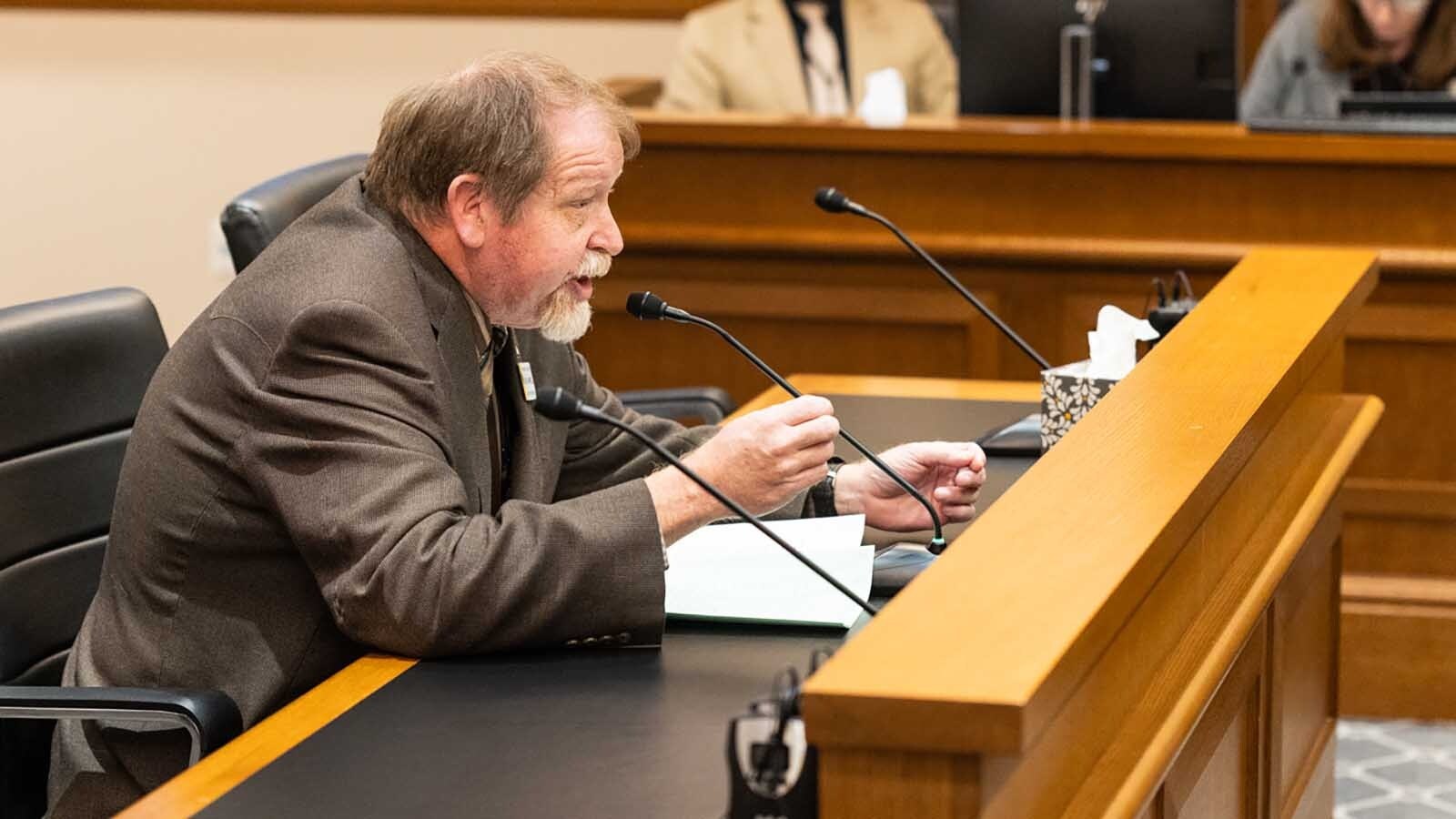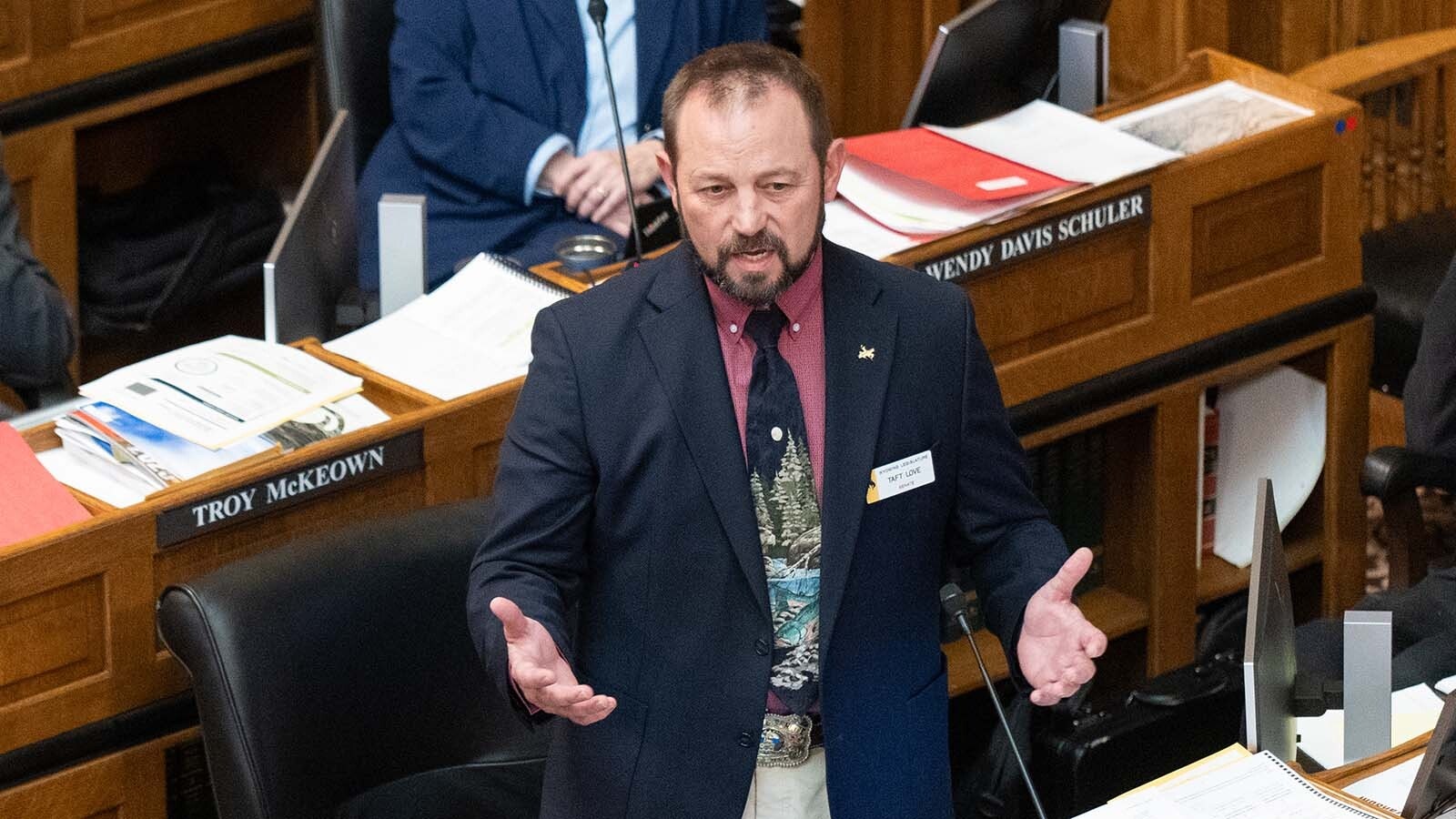A division of Wyoming’s environmental quality agency in a 4-2 vote Tuesday granted the request of a solar power company to increase one of its Laramie County projects’ battery storage by 50% — amid an emotional objection by a fourth-generation rancher living next door.
The boost is to satisfy the power generation needs of a large-scale consumer, multinational, Canadian energy company Enbridge told the Wyoming Department of Environmental Quality Industrial Siting Division during a public meeting Tuesday in Cheyenne.
Though Enbridge didn’t name the large-scale consumer, others at the meeting said it’s a data center looking to settle in the area.
Enbridge declined to confirm the point in a later email comment to Cowboy State Daily.
The Two Cowboys
Enbridge’s solar generation project slated for operation about four miles southeast of Cheyenne envisions two phases: the 2,215-acre phase titled “Cowboy I,” and the 1,630-acre phase titled “Cowboy II,” according to the company’s original permitting application to the Industrial Siting Division of the Wyoming Department of Environmental Quality.
The first phase called for 136 megawatts of battery energy storage and the second phase called for 133 megawatts.
One chart on the company’s application lists the total quantity of batteries as “not yet designated,” but a separate table breaking down removal of equipment in a reclamation scenario contemplated 2,340 batteries in Cowboy I and 2300 in Cowboy II, for a total of 4,640 batteries.
That was before the upgrade request passed Tuesday.
Enbridge asked to upgrade Cowboy II from 133 to 200 megawatts’ storage capacity.
The company’s contracted analyses of the move were positive, Christian Dick, Enbridge’s director of project development, told the siting council.
The platform space for the battery energy storage system (BESS) would not grow but would shrink from 6.5 to 4 acres with the upgrade to a higher-capacity system, says the company’s amendment application. The increased capacity could add $135 million to the material construction cost and boost sales and property tax payouts to the community, the company said, adding that Enbridge doesn’t anticipate any changes to its traffic analysis or other impact analyses.
The company said it has been in touch with Laramie County Fire District I – which the fire department confirmed during the meeting.
First To Burn
Former state legislator and local rancher Ed Prosser opposed the upgrade, particularly over the fire risk.
The system would consist of lithium iron phosphate (LFP) batteries, contained in storage building blocks, likely Fluence Cubes, says the application.
Chief among things that can go wrong with the system is thermal runaway: the overheating of a battery cell spreading to all other battery cells and igniting in a fire that is extremely difficult to extinguish and poses other environmental hazards.
“If a fire breaks out, it’s (Prosser’s) ranch that is the first to go,” said Prosser’s attorney Jake Vogt of Hirst Applegate, who accompanied Prosser to the meeting..
Prosser told the siting council that Enbridge has been trying to get a contract with a consumer for three years with no success, wants to sell the power to the data centers – but that solar isn’t reliable enough for that.
“And the question is where does it stop?” asked Prosser. “What’s the limit? How many times do they come back for another amendment to the permit ‘til they can finally peddle this power to someone?”
Vogt cast the impact statements Enbridge’s analysts offered that day to the council as conclusory – skipping over the evidence.
“We know these types of batteries have a risk of fire,” said Vogt. “Explosions, toxic gas leaks, chemical spills… these risks exist.”
Vogt pointed to a solar battery storage facility in California that caught fire, burned for several days and ignited again a month later.
But as the conversation progressed, Prosser indicated that the issue, for him, runs deeper than the battery upgrade and the fire risk.
He became tearful and spoke of the agricultural landscape, his decades of ranching, and the unique nature of the land. No amount of reclamation could restore it to what it was, after a project of this size, he said.
“This land is very important to us,” he said. “If you don’t own land, you can’t understand your feelings for land – like I do.”
What About Us?
Dick countered, saying Enbridge and the private landowner from whom it is leasing in the agricultural area also have an acute interest in not destroying their own property in an inferno.
Enbridge is a publicly traded company.
“(Our) first value on everything we do is safety,” said Dick. “(And) I hope you’ll also lean upon the history of Enbridge within the state of Wyoming and operating with safety – a record that will be in support of your confidence that we’ll do the same here.”
The company’s original application lists multiple safety features and an emergency response plan.
As to Prosser’s claims that the company can’t sell its product, Dick said there is arguably no more mature project before the council than his own.
“If you take that under the lens of even recent federal legislative changes, I can get there,” he said. “I can be their answer.”
For three-and-a-half years, continued Dick, he’s been “aggressively working with all of the stakeholders to incorporate all their comments, issues, needs – to actually be here in a very mature position.”
“I have confidence,” he said, “that this project will turn on by the end of 2027.”
If the council had declined the upgrade, Enbridge would still have completed its project, its representatives said.
The company said in a follow-up email to Cowboy State Daily that the solar project and its upgrade fit well with Wyoming’s “all-of-the-above” energy policy and “is tightly linked to significant economic development opportunities in the State.”
The company has been operating oil pipelines and terminals in Wyoming since the 1950s, the statement adds.
The Two
The two Industrial Siting Council members who voted against the upgrade were Brenda Schladweiler and Jim Miller. The other four, members Kristin Lee, Susan Clinch, Brian Lovett and Robert Spence voted in favor.
“At least it was not a unanimous decision,” said Prosser in a later phone interview.
Clair McFarland can be reached at clair@cowboystatedaily.com.





